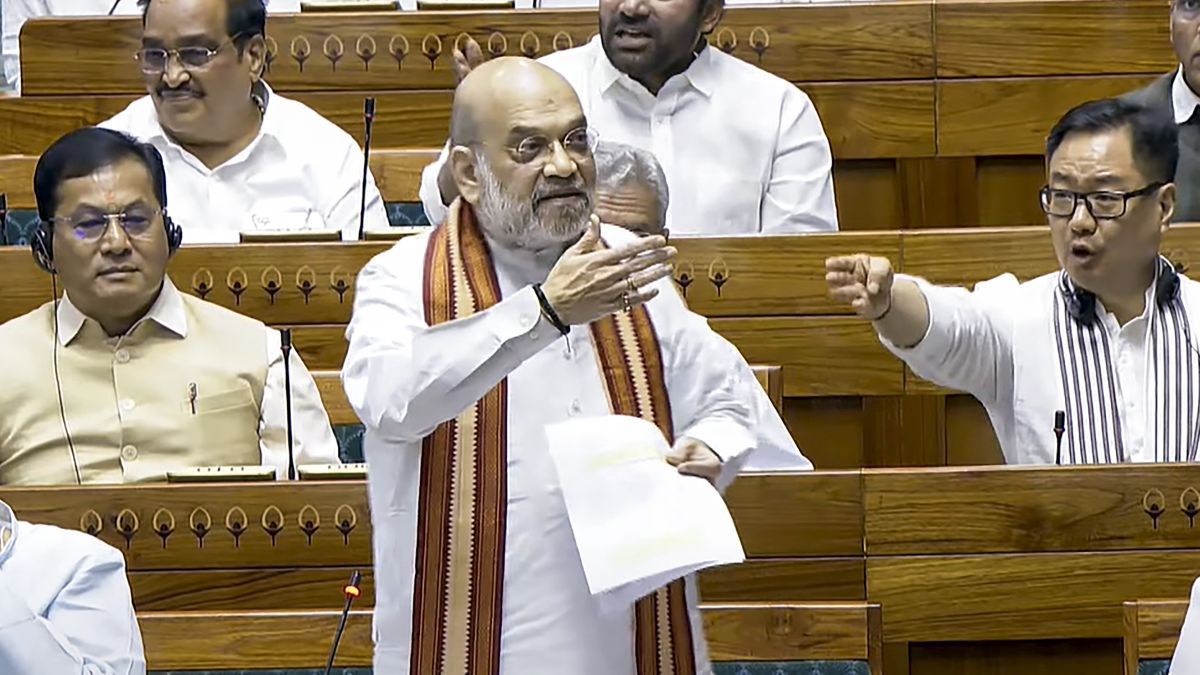India’s Home Minister Amit Shah on Tuesday explained the rationale behind entrusting the investigation of the Pahalgam terror attack to the National Investigation Agency (NIA) saying that the agency’s exceptional conviction rate and proven capabilities in handling terrorism-related cases made it the most appropriate choice.
Twenty-six people, most of them being tourists, were massacred in Jammu and Kashmir’s Pahalgam at a popular meadow by Pakistani terrorists on April 22. The terror attack sparked international outrage as terrorists chose their victims by ascertaining their religious identities. The victims were male, ensuring that they were killed while women accompanying them watched on helplessly.
Shah was speaking in the Lok Sabha during the parliamentary debate on Operation Sindoor, the military campaign India launched in the aftermath of the Pahalgam terror attack to dismantle infrastructure of terrorism in Pakistan. The strikes led to a four-day India-Pakistan military clash.
During his speech, Shah confirmed that the three Pakistani terrorists who carried out the Pahalgam terror attack were neutralised by the Indian security forces on Monday, the first day of the parliamentary debate on Operation Sindoor.
The identities of the slain terrorists and their connection with the Pahalgam attack were ascertained through due forensic processes, Shah told the lower house of Parliament. He said, “We now have proof that they were Pakistanis and were involved in the Pahalgam terror attack.”
The terror case is being probed by the NIA.
NIA’s conviction rate key to the decision
The Union home minister pointed to the NIA’s extraordinary conviction rate of over 96 per cent in terrorism cases as a central reason for assigning the sensitive Pahalgam probe to the agency.
Shah said, “I would also like to say a little about the NIA investigation. The day Lashkar-e-Taiba and its affiliate TRF claimed responsibility, we immediately decided that the investigation would be handed over to the NIA.
Impact Shorts
More Shorts“Because the NIA is a globally recognised agency that specialises in scientifically investigating terrorism cases and securing convictions, with a conviction rate of over 96 per cent. We handed the investigation to the NIA immediately.”
Earlier in December 2024, a Press Information Bureau release from the Ministry of Home Affairs last December, of the 147 cases where trials had concluded, 140 resulted in convictions, bringing the overall conviction rate to approximately 95.23 per cent.
Shah made it clear that this feat is not just a numerical achievement but an endorsement of the NIA’s rigorous investigative methods and legal preparedness. He also highlighted how the agency consistently secures justice in complex cases through structured prosecutions and detailed forensic and financial investigations.
A landmark year for NIA
The NIA’s 2024 performance was described by agency officials as one of its most successful years. The NIA data show that the agency achieved a 100 per cent conviction rate in all completed terror trials in 2024. It got conviction from courts for 68 accused in 25 cases and filed charge-sheets against 408 individuals across 80 newly registered cases.
The agency arrested 210 people across a variety of crimes, including Left-Wing Extremism (LWE), North East insurgency, jihadi terrorism and human trafficking. LWE cases dominated the entire lot, with 28 cases registered and 69 arrests made.
The data show the agency’s increasing role in managing not just religiously motivated terrorism but also insurgency and organised criminal networks that threaten national stability.
Dismantling financial and logistical ecosystems
Another factor believed to have influenced the home ministry’s decision was the NIA’s record in disrupting the financial and logistical structures that support terrorism. The agency attached 137 properties worth Rs 19.57 crore under provisions of the Unlawful Activities (Prevention) Act during 2024.
These actions were aimed at striking at the operational core of various groups by choking off their funding and material support. Shah viewed such capabilities as essential in the Pahalgam investigation, where dismantling support networks was as important as identifying the attackers.
Quick turnaround in high-profile cases
The agency has also demonstrated rapid response capabilities. In 2024, the NIA filed a charge-sheet against the Pakistan-based chief of Babbar Khalsa International, Wadhawa Singh and five others within months of the assassination of VHP leader Vikas Prabhakar in Punjab.
In another instance, it secured the conviction of four terrorists, including Kulwinderjeet Singh alias Khanpuria, in a terror conspiracy case involving multiple attacks across Delhi and Punjab in the 1990s.
Such swift and effective actions were seen by the home ministry as reinforcing the NIA’s operational credibility, making it a natural choice for high-stakes cases like the Pahalgam attack.
Structural strength and technical expertise
According to a statement tabled in the Rajya Sabha in December 2024 by Minister of State for Home Affairs Nityanand Rai, the NIA has significantly expanded its organisational capacity in recent years. Since 2019, the government has created 810 new posts, including senior leadership roles and technical experts in cyber forensics.
The agency now operates 24 offices across India and has been allocated 105 specialist posts to support investigations in areas like cyber terrorism and explosives. The establishment of the National Terror Data Fusion & Analysis Centre (NTDFAC) has also enhanced its ability to use big data analytics and digital forensics, thereby improving both speed and accuracy in investigations.
Coordination with state and global agencies
The NIA has also increased coordination with domestic and international agencies. It organised 36 Capacity Building Training Programmes and 19 similar sessions in collaboration with foreign organisations between 2019 and 2024, training thousands of officers, the PIB release said.
This increased collaboration strengthens the NIA’s capability to investigate transnational terror networks relevant in cases like Pahalgam, where cross-border involvement is suspected.


)

)
)
)
)
)
)
)
)



